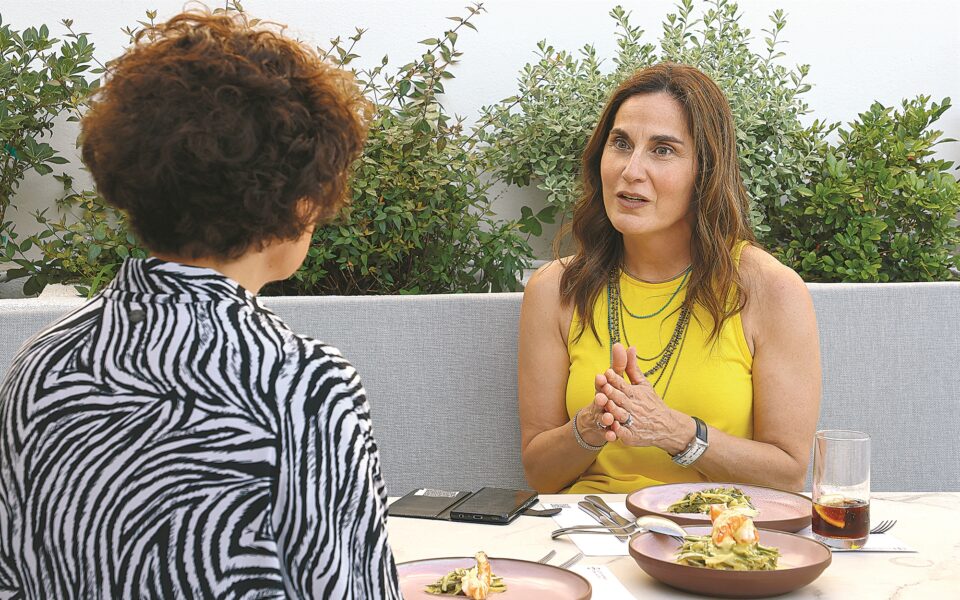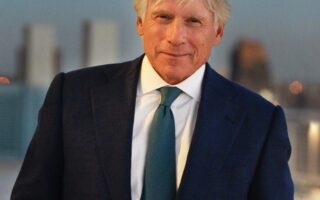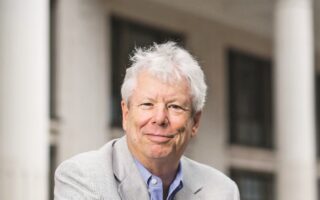‘Europe means cosmopolitanism, openness’
The head of the Minda de Gunzburg Center for European Studies at Harvard discusses the old continent and the American dream

Elaine Papoulias lives in Lincoln, Massachusetts, a small town with a population of about 7,000, half an hour from Boston, which she said reminds her of Laconia. Every day she wakes up at 5.30 a.m., in time to take her teenage daughter to school and then drive to the fine early 20th-century building that houses the Minda de Gunzburg Center for European Studies (CES), a division of the Harvard School of Arts and Sciences. Papoulias has been executive director of the “oldest university center of modern European studies,” founded in 1969, since 2013. The mission of the CES is to promote research and study of the European continent while also welcoming prominent European academics and leaders.
Papoulias was born in Boston. Her mother arrived in the United States at the age of 15 in 1952 from Sparta, and stayed with an aunt and uncle who were willing to host one of the family’s children. She tells me her story. “She’s very strong, bold, pragmatic, amazing.” Her father immigrated in the 1960s. They got married in the US. Her mother is now 87, while her father is deceased. “Every Friday after school, my mom drove my sister and I to the teacher’s house for Greek lessons – an hour’s journey – while all the other children could play. She insisted. ‘You will appreciate it someday,’ she told us. And we did, she was right.” Papoulias speaks and reads Greek, although for our discussion she prefers English. Her husband is Iranian, their daughter also speaks Farsi.
“I’ve always felt attracted to other ethnicities because we were also different where we lived in Boston. There were not many Greek families, there were more Italians. My parents were very Greek. Every Sunday we went to Sunday school until we finished high school. At the same time, they were open-minded people. Their friends were not only Greeks.”
Is America still a land of opportunity for foreigners?
I don’t know. I think there are open pockets in society as well as a lot of fear. Many of the immigrants who came to the United States and saw their lives change do not support immigration. Still others are in favor, provided there are checks and rules – not flooding the borders with irregular migrants. I can understand the problem for those who live in Texas. However, the issue has been both politicized and demonized.
‘Education has become harder to access. It’s more expensive and universities are more competitive’
What happened to the American dream?
We’ve come to realize that the American dream is not as easy as people thought. You know, people think you just come to America and you work hard and your life changes overnight. I don’t think it was ever like that. First of all, it was easier to immigrate because the immigration system was different. If you had a relative, they could invite you and they would sponsor you. And they’re trying to do this kind of system again. So you came and you had a network of people that would help you. Now there are nonprofit organizations that do that. So for instance, in the small town where we live outside of Boston, there is a Jewish synagogue and an Episcopalian church that come together.
Aren’t you in a way a living example of the American dream?
I have benefited for sure from my parents’ hard work. In the States, every generation stands on the shoulders of the one that comes before it, right? So, absolutely. My parents worked hard. They didn’t have the opportunity to really advance their education, and education was so important to them. My parents would give anything for our education. And in my generation, education really helped you advance. Now, I think it’s still the case, but I think education has become such a global commodity in the US that it still has the power to really be transformative in somebody’s life. But education has become harder to access. It’s more expensive and universities are more competitive. So, for instance, universities that during my youth we would apply to the system is different than the US. You apply to schools, private or even public, and they’re competitive.
CES is the home for students who are fascinated by Europe, although most have never traveled to it. When they start to study it, they realize that it is not only the continent with the great museums, the ancient Greek culture, but also a place of modern innovation. They understand that it is an ally and a partner. Perhaps the closest thing to the country they live in. It cultivates values, it is based on democracy.
What does Europe mean to you?
Oh, for me, Europe is so many things. I mean, it’s really a lot of things. Even when I travel around the United States, the places that I discover, I always somehow, subconsciously, wonder in my mind if they feel European enough, if I could I live here. Is it European enough? And what does that mean? To me, it means cosmopolitanism. It means loving differences and celebrating differences. I think also, when I think about the friends that I have that are closest to me, it means people that are multilingual. I guess if I had to generalize, it’s these things. I think you learn a lot about other cultures by learning their languages. So if I had to define Europe. I guess this is what it would be: cosmopolitanism, openness.
Foreign students make US influence stronger
About a million foreign students study in the US, Papoulias says. “In my view, much of the soft power and influence the US extends globally comes from the experiences of individuals that have spent time in US universities. This is something that any country debating investing and globalizing its system of higher education may see value in considering,” she explains.
Leading a program on Southeastern Europe immediately following the collapse of communism gave her a sense of “how massive upheavals and inflection points simultaneously generate hope and despair, creativity as well as fear of change,” she continues. “We face a similar moment in the United States today, and we are challenged to close the gap between – and align – our immense promise with effective performance. Perhaps never before has there been so much ability to harness the power of human thought and positive action to better the lives of others. This motivates me immensely and drives my desire to contribute to helping students ready themselves to tackle these challenges. Working with young minds gives me immense hope for the future.”
Papoulias believes the common characteristics of the very diverse students at Harvard are “their thirst for learning, their commitment to making the most of the hand that life has dealt them, and pushing and expanding their limitations.”
Undergraduate students studying at Harvard number about 2,000, selected from a pool of 60,000. She notes that a unique system is in place to cover the costs of students who cannot afford tuition fees and the cost of student life.
Asked about the idea of allowing private universities in Greece, she notes the importance of equal opportunity. “I think any debate on allowing private universities to operate in Greece should take into consideration a few fundamentals about education, and the role of higher education… Opportunity – the questions of equality of opportunity and widening inequalities are of growing concern in the US and in countries around the world – Greece of course included. Equality of opportunity rests on individuals’ ability to access education. Without it, we cannot hope to have societies that are based on merit and which have at their core values like excellence and legitimacy,” she explains.As Greece begins to think about changing the landscape for private universities, Papoulias says it may be useful to consider some lessons and experiences from the US:
• Competition in private higher education for resources, the best and brightest minds, for students, has been a key driver of and has strengthened the quality of American universities.
• Successful universities in the US are places committed to the pursuit of truth and research, where no question is taboo to ask, where ideas are the institution’s currency and value, and where the mission is to create new knowledge, not only train students.
• Significant philanthropy has been essential and transformative. Gifts of wealthy individuals to universities, who have felt gratitude to the universities that helped launch their professional pathway, or who have wanted to promote a societal good or public cause they highly value, have helped to propel the quality and impact of universities immeasurably. Moreover, government has a role to play here, for example by providing incentives such as tax deductions for such philanthropy. Finally society too, also has a role to play – to welcome and elevate individual success, and be unthreatened by individuals’ generosity and institutions’ recognition of acts of benefaction through things such as naming professorships, buildings etc after donors.
• As we learned especially but not only during the pandemic, higher education necessitates creative latitude, flexibility and the capacity to respond to change.
The competition
Papoulias says she is mindful of candidates from Southeast European countries and has informed her colleagues that she wants to examine these applications personally.
“I want to meet those kids that are competing against American students that are having consultants help them make their college application. And they have a lot of support and a lot of direction of how to structure their application. They’re also very smart. But the kids that are sending their applications from small towns in Romania, small towns in Albania or even Bucharest, they’re really amazing. One of my favorite students is a student from Albania, without a father, with a mother who worked hard to educate her. She came from a town whose teachers didn’t know how to write a letter of recommendation. Not only did she graduate from Harvard, she is now attending Harvard Business School. These students fill you with hope and optimism.”





